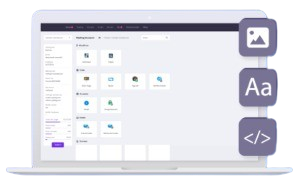Disclaimer: If you purchase via links on our site, we may receive affiliate commissions
Updated in April 2024
Top 10 Best Page Builders
Top 10 Best Page Builders
In the field of website creation, Site Builders have emerged as powerful devices that are revolutionizing the way websites are designed and constructed. From beginners to professional creators, these platforms provide an intuitive interface and drag-and-drop capability, allowing customers to create beautiful websites without any understanding of coding. This article explores the nature of Page Builders, their benefits, must-haves, Advantages and disadvantages, top website builders in the industry, and the types available in the market.

Top 10 Page Builders
What is Page Builder?
Page Builders are software equipment or plug-ins that make it easy to implement web pages without the need for a coding manually. They offer users a visible interface where they can design and personalize the layout, shape and content of their website using drag-and-drop elements. With Page Builders, individuals and corporations can quickly and effortlessly create professional searchable websites, eliminating the need to hire high-priced web builders.
Let’s get deep dive into the top 5 Best Page Builders
Features:
- Elementor gives a drag-and-drop editor with over ninety widgets such as text, photographs, and buttons, and advanced design talents like animations, custom CSS, and responsive layout options.
Advantages:
- Elementor is person-friendly, making it suitable for beginners. It gives an extensive library of templates and blocks, is exceptionally customizable with superior layout options, and benefits from ordinary updates and a large aid community.
Use Cases:
- Elementor is ideal for constructing custom websites for small agencies, creating touchdown pages for advertising and marketing campaigns, designing eCommerce sites with WooCommerce integration, crafting portfolio websites for freelancers and creatives, and developing blogs with specific layouts.
Pricing:
- Elementor offers an unfastened version with simple functions. The Pricing starts from $2.99/month.
Features:
- Divi gives a visual drag-and-drop builder with real-time design, access to over 800 pre-made designs and one hundred full website packs, and cut up testing functionality to optimize designs.
Advantages:
- Divi offers tremendous design flexibility with a massive library of pre-made layouts, strong community guide, and regular updates with new functions and enhancements
Use Cases:
- Divi is suitable for designing corporate and commercial enterprise websites, growing dynamic online shops with WooCommerce, building versatile blogs with custom layouts, growing academic web sites with engaging designs, and crafting portfolios for artists and photographers.
Pricing:
- Divi's pricing consists of an annual membership at $89/ year. And also has the different plans per year and also life time plans too.
Features:
- Beaver Builder gives the front-quit drag-and-drop editor, pre-made templates and content modules, complete control over responsive layout settings, and integration with popular plugins like WooCommerce and WPML.
Advantages:
- Beaver Builder is known for its easy and intuitive user interface. It is developer-friendly with clean code and huge hooks, lightweight and rapid, like minded with nearly any WordPress topic, and supported by way of reliable customer support and complete documentation.
Use Cases:
- Beaver Builder is beneficial for developing expert business web sites, developing landing pages and income funnels, building eCommerce websites, crafting custom layouts for blogs and information web sites, and designing club sites with plugins like Member Press.
Pricing:
- Beaver Builder's pricing starts at $99 /year and varies with different features for each pricing up to $546/year.
Features:
- Stackable complements the Gutenberg editor with a group of advanced customization blocks. These blocks encompass bins, photographs, testimonials, and extra, with responsive settings.
Advantages:
- Stackable gives light-weight overall performance, everyday updates with new blocks, incredible integration with different Gutenberg-primarily based plugins, and lower priced pricing.
Use Cases:
- Stackable is powerful for boosting content material layouts on blogs and information sites, building touchdown pages with dynamic elements, growing advertising pages, designing portfolios and showcase web sites for creatives, and growing interactive and visually attractive educational content.
Pricing:
- Stackable pricing starts from $49/year for personal to $149/year for agencies with different features.
Features:
- Thrive Themes is a conversion-focused subject builder and suite of gear that includes a drag-and-drop visible editor, included lead technology bureaucracy, and A/B checking out competencies.
Advantages:
- Thrive Themes is designed specifically for advertising and conversion optimization, providing seamless integration with electronic mail marketing services.
Use Cases:
- Thrive Themes is beneficial for building conversion-optimized web sites and landing pages, creating lead era bureaucracy and funnels, growing club sites with Thrive Apprentice, crafting blogs with attractive and interactive content, and designing income pages with excessive conversion prices.
Pricing:
- Thrive Suite is priced at $299 in keeping with 12 months for get right of entry to to all products.
Benefits of Page builder
The benefit of using Page Builders is numerous. First, they offer extraordinary ease of use, making it easy for even the non-technical to design and customize websites. In addition, Page Builders generally include a wide variety of pre-designed templates and elements, saving customers effort and time in the layout process. Additionally, they offer flexibility and scalability, allowing users to easily modify and expand their website as their needs evolve. In addition, Page Builders regularly includes features including mobile responsiveness and SEO optimization, ensuring that websites are practical and visible to a wider target audience.
Why do we need a Page builder?
In Present age, a strong online presence is essential for organizations and alike people. But now, no one has the time, resources or technical knowledge on how to build a website from scratch. Page Builders are available here. By simplifying the process of starting a website and eliminating the need for coding, Page Builders make different Internet designs, allowing anyone to create a professional-looking website quickly and affordably. Whether you are a small commercial business owner, a freelancer or a budding blogger, Page Builders provide the right solution to turn your online vision into a lifestyle.
Advantages and Disadvantages of Page builders
Advantages:
Like every era, Page Builders include has their own personal set of Advantages and disadvantage. On the high-quality side, they offer ease of use, speed, and affordability, making them accessible to a wide range of users. Additionally, Page Builders allow for short prototyping and experimentation, allowing customers to quickly iterate on their designs.
Disadvantages:
Page Builders may additionally have limits in terms of customization and versatility compared to hand-coded web pages. Additionally, relying on third party plugins and templates can cause overall performance issues once in a while. Therefore, it is vital that customers carefully look at disadvantages and advantages before choosing a Site Builder for their business.
Types of Page Builders
Page Builders can generally be divided into the most prominent types: stand-alone systems and plugins.
Stand-alone platforms: These are complex structures creating websites that include hosting, domain registration and various important functions similar to the Site Builder itself. Like Shopify, etc.,
Plugins: These are accessories that can be integrated into existing content management systems (CMS) along with WordPress or Joomla. Plugins like Elementor, Beaver Builder, and Divi Builder enhances the functionality of these CMS platforms by providing drag-and-drop Page Builder competencies.
Conclusion
In conclusion, Page Builders has democratized web design, making it accessible to people and agencies of all sizes. By providing intuitive interfaces, pre-designed templates, and drag-and-drop functionality, Page Builders have simplified the website implementation process and enabled customers to translate their online visions into lifestyles without coding information. While they offer a number of advantages, it is important that customers carefully consider their Page Builders preferences and limitations before choosing the right device for their mission. With the top groups in the discipline constantly innovating and improving their services, the future of web design looks promising with Page Builders at the forefront.
















